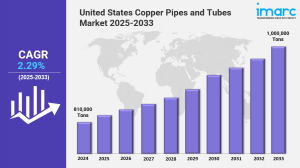United States Copper Pipes and Tubes Market Size, Share & Report 2025-2033
The United States copper pipes and tubes market size reached 810,000 Tons in 2024 to reach 1,000,000 Tons by 2033, at a CAGR of 2.29% during 2025-2033.
BROOKLYN, NY, UNITED STATES, June 9, 2025 /EINPresswire.com/ -- Market Overview 2025-2033The United States copper pipes and tubes market size reached 810,000 Tons in 2024. Looking forward, IMARC Group expects the market to reach 1,000,000 Tons by 2033, exhibiting a growth rate (CAGR) of 2.29% during 2025-2033. The industry is witnessing steady growth driven by rising demand in construction, plumbing, and HVAC systems. Technological advancements, infrastructure upgrades, and sustainability trends are boosting adoption. Increased urbanization and renovation activities further contribute to the expanding market landscape across the country.
Key Market Highlights:
✔️ Strong market growth driven by increasing demand in HVAC, plumbing, and industrial applications
✔️ Rising preference for durable, corrosion-resistant, and energy-efficient copper solutions
✔️ Expanding investments in construction, infrastructure, and renewable energy sectors
Request for a sample copy of the report: https://www.imarcgroup.com/united-states-copper-pipes-tubes-market/requestsample
United States Copper Pipes and Tubes Market Trends and Drivers:
The United States copper pipes and tubes market is experiencing steady expansion, driven by a combination of large-scale infrastructure investments and increasing demand across both residential and commercial construction segments. Federal initiatives such as the Infrastructure Investment and Jobs Act have provided a strong foundation for market acceleration, allocating substantial funding toward the modernization of aging water systems, HVAC installations, and industrial facilities—core applications where copper tubing is preferred for its durability, thermal performance, and corrosion resistance.
In 2024, non-residential construction projects—including data centers, semiconductor fabrication plants, and renewable energy installations—accounted for more than 35% of the country’s copper pipe consumption. The United States copper pipes and tubes market share remains resilient, supported by stringent building codes that emphasize the use of fire-resistant and long-lasting materials. This regulatory environment continues to position copper as a reliable choice over alternatives like PVC and PEX in mission-critical infrastructure.
Despite positive momentum, the market faces ongoing challenges such as raw material price volatility and increasing competition from composite materials. To maintain competitiveness, manufacturers are innovating with cost-efficient copper alloy blends while also responding to growing sustainability demands. Copper’s full recyclability makes it an integral part of circular economy strategies. In fact, by 2024, approximately 45% of copper used domestically came from recycled sources—fueled by corporate sustainability targets and government-backed incentives for energy-efficient construction upgrades.
These developments have significantly contributed to United States copper pipes and tubes market growth, as advanced recycling technologies reduce production costs and enable more competitive pricing. However, the supply chain remains exposed to global market risks. Around 60% of refined copper used in the U.S. is imported from countries such as Chile, Peru, and Canada, making the industry vulnerable to international trade disruptions.
To counterbalance this, 2024 saw the implementation of tariffs on imported copper tubing, intended to strengthen domestic output. These measures led to a 12% year-over-year increase in U.S. mill production but also drove copper futures up by 18% in Q2 2024, underscoring the market's sensitivity to pricing fluctuations. As a result, some industries—particularly automotive and electronics—have begun evaluating material substitutes such as aluminum to manage escalating input costs. In response, domestic manufacturers are investing in regional smelting facilities and digital supply chain technologies to improve resilience and reduce reliance on foreign supply.
The United States copper pipes and tubes market size reached approximately 810,000 tons in 2024, marking a significant milestone in the sector’s evolution. Technological innovation continues to shape the landscape, with over 25% of U.S. manufacturers adopting IoT-enabled quality control systems and AI-powered predictive maintenance solutions. These advancements have helped reduce production downtime by roughly 30%, enhancing overall operational efficiency.
Demand for antimicrobial copper tubing is also accelerating, particularly in the healthcare sector. In the wake of stricter hygiene regulations post-pandemic, 15 states have enacted legislation mandating bacteria-resistant copper piping in hospital and clinical infrastructure, further contributing to United States copper pipes and tubes market growth.
Additionally, copper’s role in the clean energy transition is expanding. It is increasingly used in electric vehicle charging infrastructure, solar thermal systems, and other renewable technologies—extending the material’s relevance beyond traditional plumbing and construction use cases. Although inflationary pressures and regulatory uncertainties persist, the industry is addressing these challenges through vertical integration, strategic alliances, and enhanced production capabilities.
Looking forward, the United States copper pipes and tubes market is positioned for continued growth, supported by trends in decarbonization, smart city development, and national infrastructure renewal. The United States copper pipes and tubes market size is projected to rise from 810,000 tons in 2024 to 1,000,000 tons by 2033, reflecting a compound annual growth rate (CAGR) of 2.29% over the forecast period.
Checkout Now: https://www.imarcgroup.com/checkout?id=3308&method=1190
United States Copper Pipes and Tubes Market Segmentation:
The report segments the market based on product type, distribution channel, and region:
Study Period:
Base Year: 2024
Historical Year: 2019-2024
Forecast Year: 2025-2033
Breakup by Finish Type:
• LWC Grooved
• Straight Length
• Pan Cake
• LWC Plain
Breakup by Outer Diameter:
• 3/8, 1/2, 5/8 Inch
• 3/4, 7/8, 1 Inch
• Above 1 Inch
Breakup by End User:
• HVAC
• Industrial Heat Exchanger
• Plumbing
• Electrical
• Others
Breakup by Region:
• Northeast
• Midwest
• South
• West
Ask Analyst & Browse full report with TOC & List of Figures: https://www.imarcgroup.com/request?type=report&id=3308&flag=C
Browse Related Reports =
https://www.imarcgroup.com/mexico-tube-packaging-market
https://www.imarcgroup.com/mexico-hdpe-pipes-market
https://www.imarcgroup.com/united-states-project-portfolio-management-market
https://www.imarcgroup.com/united-states-medical-tubing-market
https://www.imarcgroup.com/mexico-copper-pipes-tubes-market
Competitive Landscape:
The market research report offers an in-depth analysis of the competitive landscape, covering market structure, key player positioning, top winning strategies, a competitive dashboard, and a company evaluation quadrant. Additionally, detailed profiles of all major companies are included.
About Us:
IMARC Group is a global management consulting firm that helps the world’s most ambitious changemakers to create a lasting impact. The company provide a comprehensive suite of market entry and expansion services.
IMARC offerings include thorough market assessment, feasibility studies, company incorporation assistance, factory setup support, regulatory approvals and licensing navigation, branding, marketing and sales strategies, competitive landscape and benchmarking analyses, pricing and cost research, and procurement research.
Elena Anderson
IMARC Services Private Limited
+1 631-791-1145
email us here
Legal Disclaimer:
EIN Presswire provides this news content "as is" without warranty of any kind. We do not accept any responsibility or liability for the accuracy, content, images, videos, licenses, completeness, legality, or reliability of the information contained in this article. If you have any complaints or copyright issues related to this article, kindly contact the author above.
Restaurante de cortes: guía de los cortes más icónicos y su maridaje perfecto
LOMA Film Festival Returns for Third Year to Spotlight Mixed Latinx Identities and Cultural Innovation
Ivey Engineering Awards $1,000 Scholarship to Mission University Student Gavin Hall
Więcej ważnych informacji
 Jedynka Newserii
Jedynka Newserii

 Jedynka Newserii
Jedynka Newserii

Konsument

Grupa nowych biednych emerytów stale się powiększa. Ich świadczenie jest znacznie poniżej minimalnej emerytury
Przybywa osób, które z powodu zbyt krótkiego czasu opłacania składek pobierają emeryturę niższą od minimalnej. Tak zwanych nowych biednych emerytów jest w Polsce ok. 430 tys., a zdecydowaną większość grupy stanowią kobiety – wskazują badania ekspertów Instytutu Pracy i Spraw Socjalnych. W ich przypadku krótszy okres składkowy zwykle wynika z konieczności opieki nad dziećmi lub innymi osobami w rodzinie. Wśród innych powodów, wymienianych zarówno przez panie, jak i panów, są także praca za granicą lub na czarno oraz zły stan zdrowia.
Media i PR
M. Wawrykiewicz (PO): Postępowanie z art. 7 przeciw Węgrom pokazało iluzoryczność tej sankcji. Unia wywiera naciski poprzez negocjacje nowego budżetu

Przykład Węgier pokazał, że procedura z artykułu 7 traktatu o UE o łamanie praworządności nie ma mocy prawnej z powodu braku większości, nie mówiąc o jednomyślności wśród pozostałych państw członkowskich. Negocjacje nowego budżetu UE to dobry pretekst do zmiany sposobu części finansowania z pominięciem rządu centralnego. Czerwcowy marsz Pride w Budapeszcie pokazał, że część społeczeństwa, głównie stolica, jest przeciwna rządom Viktora Orbána, ale i na prowincji świadomość konsekwencji działań Fideszu staje się coraz większa przed przyszłorocznymi wyborami.
Firma
Blockchain zmienia rynek pracy i edukacji. Poszukiwane są osoby posiadające wiedzę z różnych dziedzin

Zapotrzebowanie na specjalistów od technologii blockchain dynamicznie rośnie – nie tylko w obszarze IT, ale również w administracji, finansach czy logistyce. Coraz więcej uczelni wprowadza programy związane z rozproszonymi rejestrami, które wyposażają studentów w umiejętności odpowiadające wymogom rynku.
Partner serwisu
Szkolenia

Akademia Newserii
Akademia Newserii to projekt, w ramach którego najlepsi polscy dziennikarze biznesowi, giełdowi oraz lifestylowi, a także szkoleniowcy z wieloletnim doświadczeniem dzielą się swoją wiedzą nt. pracy z mediami.


![Nestlé w Polsce podsumowuje wpływ na krajową gospodarkę. Firma wygenerowała 0,6 proc. polskiego PKB [DEPESZA]](https://www.newseria.pl/files/1097841585/fabryka-nesquik_1,w_85,r_png,_small.png)






.gif)

 |
| |
| |
|